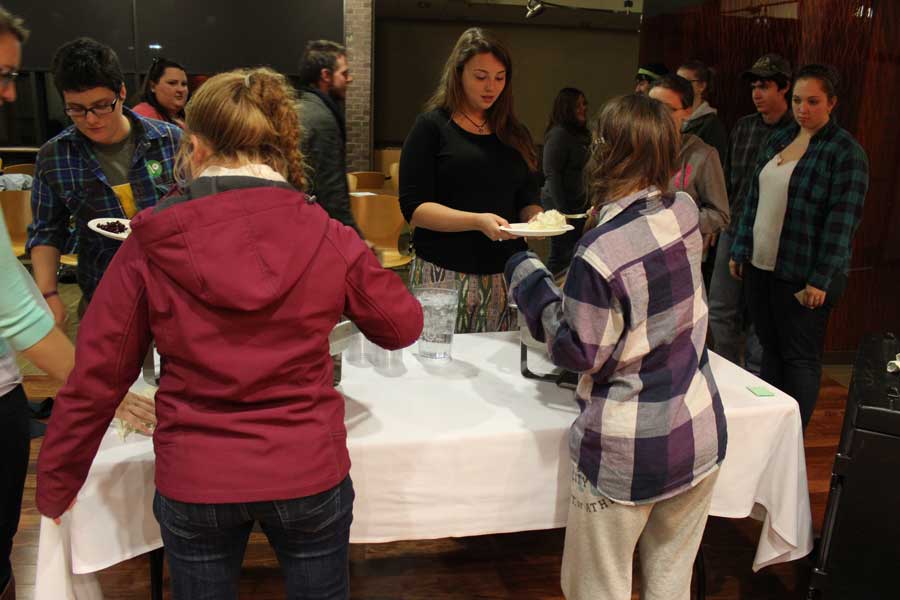Oxfam Hunger Banquet spotlights global hunger
What you get depends on who you are
The issue of global hunger and poverty was brought to the Johnson State College campus on Thursday Nov. 14 with an Oxfam Hunger Banquet hosted by the SERVE office in coordination with Arthur Hall Advisor Allie O’Hara.
Oxfam (Oxford Committee for Famine Relief) is an international confederation of 17 organizations joined together in more than 90 countries as part of a global movement for change. Its goal is to abolish the injustice of poverty.
At Oxfam’s hunger banquets, hosts can collect donations that will be distributed to countries in need. Currently, it’s looking for donations to help bring clean drinking water and sanitation to victims of Typhoon Haiyan, which recently hit the Philippines.
According to SERVE Mentoring Coordinator Samantha Flint, Johnson State College used to host an Oxfam Hunger Banquet annually, but because of a lack of interest and other big events on campus, it fell by the wayside for three years.
This year, O’Hara wanted to run the banquet as a building program, and bring hunger awareness to campus before the holidays. She went to Flint for help in facilitating. “Oxfam makes it really easy to get the materials to run your own on campus. You just have to go to their website, fill out an interest form, and they have all of the materials printable from their website,” said Flint.
According to Oxfam hunger isn’t about having too many people and not enough food; it’s about power and inequities in access to resources. Nearly one-in-eight people go to bed hungry every night, and every five seconds, hunger claims one child’s life. The problem is that companies and governments control the global food system. They often determine who eats and who doesn’t.
Two of the top companies in the United States that control the food system are Monsanto, which is the largest producer of genetically modified seeds, and Tyson, the world’s largest meat producer. Then there are companies like Erich-Wesjohann-Gruppe, which is the global market leader in poultry genetics.
Today, the three largest seed companies control more than 50 percent of the market. In chicken breeding the top four companies control 99 percent of the market share of genetics, and many local breeds and food crops are being lost.
To portray this real-world issue at the Oxfam banquet, details such as where participants sit, the meal they have to eat, and the utensils they eat with, or lack thereof, are chosen by the luck of the draw. Everyone picks a card out of a bag, each with a story of who they represent and what class they live in.
Drawing this profile out of a bag symbolizes that people don’t always have a choice in where they end up. Most are born into their class without the resources to raise them up in society.
Profiles range from a 40-year old Peruvian mayor in the upperclass to a young farmer from Ethiopia living in poverty.
Before anyone could be served, a script provided by Oxfam was read to all of the participants. It stated the reasons for putting on the event and how each class would be served; some classes were restricted from certain foods and in the lower and middle class women had to move to the end of the line.
The low class people were forced to sit on the floor. They received only one scoop of rice and one scoop of beans, which they had to eat with their hands.
The middle class people were privileged enough to sit in chairs, receive two scoops of rice and beans, and use a spoon to eat their meal.
The upper class people, on the other hand, sat at tables, ate baked ziti and salad, and were privileged with forks and as much food as they wanted.
Only 20 people attended the hunger banquet, but Flint and O’Hara said they were satisfied with the turnout. Their original goal was to attract 40. “It’s difficult when we haven’t hosted an event like this in a few years, and when it’s cold out, students often don’t want to leave their dorms for anything,” said Flint. “It’s really the quality of the information and what people take away from it that matters, rather than the quantity of participants.”
For those who attend one of the banquet events, most won’t leave with a full stomach, but Oxfam’s hope is that everyone learns something.
All of the food served at the banquet was donated by Sodexo, and the SERVE office is still collecting donations for Oxfam.
Kayla served as a general assignment reporter and photographer for the spring 2013 semester. She returned for the Fall 2013 and spring 2014 semesters...



